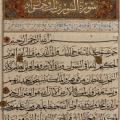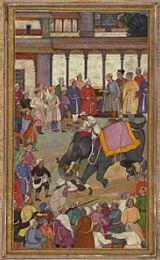182 - Aftermath: Philosophy and Science in the Mongol Age
Philosophy and science survive and even thrive through the coming of the Mongols.
Themes:
• W. Madelung, “At-Taftazani und die Philosophie,” in D. Perler and U. Rudolph (eds), Logik und Philosophie: Das Organon im arabischen und im lateinischen Mittelalter (Leiden: 2005), 227-38.
• T. May, The Mongol Empire (Edinburgh: 2018).
• D.O. Morgan, The Mongols (Oxford: 1986).
• R. Morrison, “Falsafa and Astronomy After Avicenna: an Evolving Relationship,” in Y.T. Langermann (ed.), Avicenna and His Legacy: a Golden Age of Science and Philosophy (Turnhout: 2009), 307-26.
• A.I. Sabra, “Science and Philosophy in Medieval Islamic Theology: the Evidence of the Fourteenth Century,” Zeitschrift für die Geschichte der arabisch-islamischen Wissenschaften 9 (1994), 1-42.
Thanks to Heidrun Eichner and Sonja Bretjes for making available to me as yet unpublished work on this period.







Comments
Denn wir sind Mongolen!
Dschinghis Khan perform "Dschinghis Khan" at the 1979 Eurovision Song Contest.
Wow again such an
Wow again such an enlightenment talk !
Concerning Baghdad and Iraq as a whole, read in some recent historiographical works that it already lost its 'prestige' when the central Abbasid powers was weakened by peripheral dynasties and powers (like the Seljuqs you mentioned)and that by the 11th century it already 'culturally' lost to Cairo (which benefited from the Fatimids) and had a rising rival in the shape of Damascus ; it's also interesting remark that at Tusi saved 100.000s of books from the Bayt al Hikma and considering the 'intellectual network' of the region at the time, the most important books were already lying in other libraries by then I guess, but we still need to study/edit all works of the 'major' thinkers (Ibn Sina, Ibn al Haytham, ...) I doubt I'll see a comprehensive study of the pre-1258 manuscripts in my life-time.
About Bar Hebraeus, was quite a genius wasn't he and though I'm totally ignorant of their literature, but it's quite rich to say the least : came across the number of 10,000 manuscripts, quite a number if you consider their population, and I'm sure there are a lot of philosophy (or more like 'philosophical theology' à la al Ghazali) there.
Finally, on Shiraz, it definitely deserves a mention of its own : Muhammad Suheyl Umar has shown the influence of the Shirazi philosophers on the Indo-Pak sub-continent through the sheer number of their names in the region's main curriculum, the Dars e Nizami, which might surprise few but had more works of philosophy than pure religious sciences !
And as if producing philosophers/scientists was not enough, it came up with two of the greatest voices of world poetry : Saadi & Hafez, the latter born only 30 years after the former's passed away (which says a lot about the intellectual/cultural dynamics of Shiraz, and probably the region as a whole).
In reply to Wow again such an by Arslan Akhtar
Baghdad and Shiraz
Hi, thanks and glad you liked the episode! Yes, I agree Baghdad was a fading force before the Mongols came along. And as for Shiraz, just stay tuned for next week's episode which is all about developments in that city.
Central Asian Philosophy
Three separate but related comments, though you'll have to wait for ibn al-Nafis to comment for any originality.
1) I can't wait for the cross-over episode with the Mongol influence on Chinese philosophy and the connections between the two in the time of Qublai and his successors! (Not a German band, but at least a Coleridge poem?) Any news on this keenl expected.
2) It would be great to get a specialist on to talk about Mongol philosophy and the philosophy of Central Asian nomads more generally. I'm sure there's a lot of philosophical content to find in 'Yasa' and 'Töre' and so forth.
3) Do you have any thoughts on where to fit classical Persian philosophy in? The trades descriptions act might get you for the Persia-shaped gap between Egyptian-Babylonian (Africana), Roman (Hellenic) and Islamic philosophy.
In reply to Central Asian Philosophy by Isaac of York
Central Asia
Yes, actually one of the more common questions I get has been about "Persian philosophy" - there are several threads about it in comments here on the site. If I had it to do over again, I would probably do a background episode on pre-Islamic Persian culture at the start of the Islamic world episode, like on Zoroastrianism. But for the most part Persian thought is covered very well, with many figures from Persia covered in the series, so I don't feel it is too much of an omission though I know some people would like to see a special category or series just for Persia - but as I've said elsewhere here on the site I'm skeptical that that is necessarily a better way of organizing the material, I see it more as a different option.
Islamic Intellectual Traditions
Professor Adamson,
Good afternoon - has been a pleasure being able to re-listen to many of these lectures, particularly during this section on Islamic philosophical tradition. I have been hoping to inquire on a few points for several months now, as I have been continuing my study into the Ash'ari tradition within Islam. In my earliest forays into learning Islamic philosophy and theology, figures such as Avicenna and Averroes loomed largest from an American perspective - at least to myself. Al-Ghazali I was aware was a theologian within the Ash'ari school, but he seemed like the lone figure representing devout (for lack of a better word) Islamic theological influence within philosophy itself. I compared this to the Christian tradition, whereby numerous religious scholars double over as the foremost 'philosopher's' of the entire medieval period - Anselm, Duns Scotus, Albert of Cologne, Aquias and so forth. So, after a great deal of reading I was able to discern that Al-Ghazali was indeed only the tip of the iceberg, and that within the Ash'ari school in particular, and the Maturidi school to a good extent as well - dozens of scholars existed, working primarily as jurists, who may well have contributed greatly to philosophy and theology. Indeed, several have been thoroughly covered within this series - not least of which is Fakhr al-Din al-Razi, but also al-Taftazani, al-Juwayni and al-Ash'ari himself. I further began to understand that the Hanbali school of thought, existed, arguably, as both a juridical school and as a default theological school, and that scholars of this tradition, such as Ibn Taymiyyah, largely rejecting the approach taken to theological issues that Al-Ash'ari laid forth in the 10th century - naturally had less to say, and thus less to contribute in these areas. Nevertheless, it is important to provide the influence of Ibn Taymiyyah on even contemporary intellectual thought within the Islamic world - and hence he was covered significantly.
My specific question relates to the Ash'ari tradition. I am wondering if you provide much weight or merit to the scholarly tradition that seems to have existed within Cairo primarily between 1250 and as late as 1650 or so. The Ash'ari school seems to be in decline in its position in Central Asia and Iran once the Mongols come through. Thereafter Shiism will emerge more pronounced with the coming of the Safavids. Al-Baydawi, Al-Iji and Al-Taftazani are all obviously present in the greater Iranian world, but after Al-Jurjani I wasn't coming across many further figures within the tradition. Cairo however seems to be at the center of a great deal of Ash'ari scholarship. Most prominently - to include - Al-Mundhiri, Izz al-Din ibn Abd al-Salam, Al-Qurtubi, Al-Nawawi, Ibn Daqiq al-Id, Al-Dimyati, Jamal al-Din al-Isnawi, Taj al-Din al-Subki, Al-Zarkashi, Ibn al-Mulaqqin, Siraj al-Din al-Bulqini, Zain al-Din al-Iraqi, Nur al-Din al-Haythami, Ibn Hajar al-Asqalani, Al-Mahalli, Al-Sakhawi, Al-Suyuti, Al-Qastallani, Al-Sha'rani, Shihab al-Din al-Ramli, Al-Khatib al-Shirbini, Ibn Hajar al-Haytami, Zakariyya al-Ansari. Some of these individuals may err more on the end of jurists, and others theologians. I suppose in part I am just curious if in your opinion the Ash'ari intellectual tradition post-Fakhr al-Din al-Razi is more centered in the Mamluk/Egypt part of the world as opposed to in the Mongol/Iran part of the world - or do you find that even if true, the concerns of Al-Asqalani and Al-Suyuti, etc, are really only concerned with insular Islamic topics - Hadith, Fiqh, etc. and don't pose much impact on philosophy per se. I hope you don't mind this lengthy question - I have found the study of the history of Islamic philosophy, theology and related intellectual fields fascinating - but at times difficult to discern where the fault lines from one topic to the next lie. Thank you again for all the work put into your series.
In reply to Islamic Intellectual Traditions by Lowell
Later traditions
That is a great question! Basically the answer is "I don't know" since my real expertise here goes up to about the time of the Mongol conquest, so the school of Tusi at Maragha. I have read around a bit on what happened after that, to write the podcasts and more generally, but actually the period you are mentioning is something of an uncharted territory in western scholarship in general and not only a "gap" for me personally. But in principle, I do think the Asharite tradition is a good place to look for more interesting philosophical ideas, fusing kalam concerns with ideas from Avicenna, critique of those ideas, etc.
Add new comment